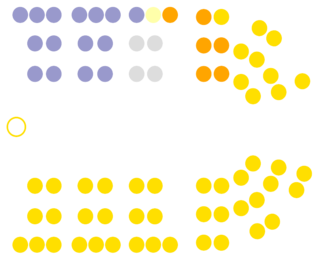
The 1890 New Zealand general election was one of New Zealand's most significant. It marked the beginning of party politics in New Zealand with the formation of the Liberal Government, which was to enact major welfare, labour and electoral reforms, including giving the vote to women.

The 1893 New Zealand general election was held on 28 November and 20 December in the European and Māori electorates, respectively, to elect 74 MPs to the 12th session of the New Zealand Parliament. The election was won by the Liberal Party, and Richard Seddon became Prime Minister.

The 1896 New Zealand general election was held on Wednesday, 4 December in the general electorates, and on Thursday, 19 December in the Māori electorates to elect a total of 74 MPs to the 13th session of the New Zealand Parliament. A total number of 337,024 (76.1%) voters turned out to vote.
City of Auckland was a New Zealand electorate formed for the election of 1853. It covered the core of Auckland during the early days of New Zealand democracy, when the city was small enough to be covered by two or three seats. It existed from 1853 to 1860, and from 1890 to 1905.

Wairarapa is a New Zealand parliamentary electorate. It was first created in 1858 and existed until 1881. It was recreated in 1887 and has since existed continuously. The current Wairarapa electorate MP is Mike Butterick.
Bay of Islands is a former New Zealand parliamentary electorate. It existed during various periods between 1853 and 1993. It was thus one of the original 24 electoral districts, and New Zealand's first ever MP was elected, although unopposed, in the Bay of Islands; Hugh Carleton thus liked to be called the Father of the House.
Waitemata was a New Zealand parliamentary electorate, from 1871 to 1946, and then from 1954 to 1978. It was represented by 18 members of parliament.
Avon is a former New Zealand parliamentary electorate. It was created for the 1861 general election and existed until 1996. It was represented by 13 Members of Parliament and was held by Independents, Liberal Party or Labour Party representatives.
Western Maori was one of New Zealand's four original parliamentary Māori electorates established in 1868, along with Northern Maori, Eastern Maori and Southern Maori. In 1996, with the introduction of MMP, the Maori electorates were updated, and Western Maori was replaced with the Te Tai Hauāuru and Te Puku O Te Whenua electorates.
Timaru was a parliamentary electorate, in New Zealand's South Island. It existed continuously from 1861 to 1996 and was represented by eleven Members of Parliament.
Thames is a former New Zealand electorate, in the Thames-Coromandel District. It existed from 1871 to 1946.
Inangahua is a former parliamentary electorate in the Buller District, which is part of the West Coast region of New Zealand, from 1881 to 1896. The town of Inangahua Junction, which gave the electorate its name, was located in the adjacent Buller electorate until 1887.
Kaiapoi was a rural New Zealand electorate, north of Christchurch in the Canterbury region of New Zealand from 1861 to 1946. It was represented by twelve Members of Parliament.
Waipawa was a parliamentary electorate in the Hawke's Bay Region of New Zealand, from 1881 to 1946.
Wellington Suburbs was a parliamentary electorate in Wellington, New Zealand. It existed from 1893 to 1902, then from 1908 to 1911, and from 1919 to 1946. The electorate was represented by six Members of Parliament.

John McEffer Shera was a Liberal Party Member of Parliament in Auckland, New Zealand.

The 12th New Zealand Parliament was a term of the New Zealand Parliament. It was elected at the 1893 general election in November and December of that year.
The Grey Lynn by-election 1963 was a by-election held in the Grey Lynn electorate in Auckland during the term of the 33rd New Zealand Parliament, on 18 May 1963.
The City of Christchurch by-election of 1896 was a by-election held on 13 February 1896 during the 12th New Zealand Parliament in the urban seat of the City of Christchurch. The by-election was triggered by the appointment of William Pember Reeves as Agent-General to the United Kingdom. The Liberal Government led by Richard Seddon had trouble finding a suitable candidate and delayed Reeves' resignation until the day he left his home in Christchurch to take up the London post. Nonetheless, rumours of Reeves' pending resignation had been circulating for a month and candidates were lining up. The Liberal Party candidate who was secured resigned within a week of Reeves' eventual resignation, and a new candidate had to be found. Three candidates contested the election: Richard Molesworth Taylor was the official Liberal Party candidate, Tommy Taylor was a prohibitionist also with liberal views but an ardent opponent of Seddon, and Charles Lewis was the reluctant conservative candidate of the opposition. Being a Liberal Party stronghold, vote splitting between those candidates who held liberal views secured the election win for Lewis, with the Liberal Party candidate coming last.

The 1892 Rangitikei by-election was a by-election held during the 11th New Zealand Parliament in the Rangitikei electorate of the North Island. This was the fifth by-election since the Rangitikei electorate was established for the 1861 election. The previous by-election took place in 1880 and the following one took place in 1909. Robert Bruce, who had previously been the MP for Rangitikei between 1884 and 1890, won the by-election narrowly.







